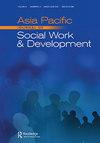对风险的不同认识及其对柬埔寨实施危害预防方案的影响
IF 1
4区 社会学
Q3 SOCIAL WORK
Asia Pacific Journal of Social Work and Development
Pub Date : 2023-08-22
DOI:10.1080/02185385.2023.2246946
引用次数: 1
摘要
本文章由计算机程序翻译,如有差异,请以英文原文为准。
Differing perceptions of risk and the implications for the delivery of harm prevention programmes in Cambodia
ABSTRACT In 2005, Cambodia implemented harm prevention as a guiding principle in their National Strategic approach. In this practice-based research, social and community work practitioners at a community-based non-government organisation (NGO) delivered harm prevention workshops to 18 villages in rural Cambodia. Findings indicated that traditional expert understanding of risk did not always match how communities perceived risk. By engaging with the community utilising a Participation Action Research approach, Children’s Future International (CFI) found their expert position shifted to one where the communities became the experts, empowering them to be actively engaged in risk reduction strategies. These findings have implications for community engagement, development and targeting of harm prevention workshops.
求助全文
通过发布文献求助,成功后即可免费获取论文全文。
去求助
来源期刊

Asia Pacific Journal of Social Work and Development
SOCIAL WORK-
CiteScore
4.10
自引率
5.00%
发文量
21
 求助内容:
求助内容: 应助结果提醒方式:
应助结果提醒方式:


